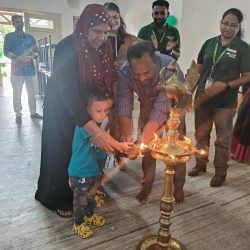What Does the Word “CANCER” Mean to You?
 It may mean many things including pain, but most of you would not immediately think of abandonment by the husband, of children being orphaned, or of living with not only the pain of cancer, but also the pain of rejection, feeling of worthlessness and total despair.
It may mean many things including pain, but most of you would not immediately think of abandonment by the husband, of children being orphaned, or of living with not only the pain of cancer, but also the pain of rejection, feeling of worthlessness and total despair.
Amidst all the sadness, is it not heartening to see that someone cares?
The Assistant Sub-Inspector of Police, Mr Vijayraj, found Vasantha and brought her to us – giving us the privilege of doing what little we could to ease her suffering.
C. Maya reports in The Hindu on World Palliative Care Day:
For some respite from the pain
Vasantha is just 37. But as she lies on the hospital bed, floating in and out of consciousness, she looks a hundred years old.
Painkillers coursing through her system sustain her through the day, giving her some relief from the unrelenting pain of cancer. But the anguish she goes through, just looking at her two young girls by her bedside, cannot be dulled by a shot of morphine.
Vasantha’s physically challenged sister, her sole caretaker, is helpless every time Vasantha cries over the fate of her children. Vasantha was brought to the palliative care clinic run by Pallium India at SUT Hospital four days ago by Vijayaraj, a palliative care volunteer. He found her at her house in Keezhattoor, Kattakkada, doubled over and writhing in pain. With pain relief and care, she is at least able to sit up and talk now. “All we can do now is to assure her that her two girls – aged 15 and 13 years – will be in safe hands,” says Vijayaraj, an ASI at AR Camp, Nandavanam.
Vasantha had been diagnosed with breast cancer four years ago and she had undergone mastectomy (breast removal) at the Regional Cancer Centre. By the time she came back from the hospital, her husband had abandoned her for another woman. With only an ailing father and a physically challenged sister at home, her hopes died fast.
“She used to go for manual labour and take good care of us. She kept her pain to herself and sent the children away to a charity hostel,” Vasantha’s sister says. She refused treatment because there was no money or support.
“I was fed up. I stopped taking the medicines because they gave me severe stomach upsets and mouth ulcers. I knew I was dying but nothing had prepared me for the pain that will kill me a little day by day,” Vasantha says.
Her children, brought to visit her by a neighbour, looked bewildered. Seeing their mother at peace had given them the tiny hope that she will come home soon.
“It is a sad, sad story and one that we cannot rewrite, however much we would like to. But then, this is the story of every patient we see,” says Dr. Sithara, at Pallium India.
“Think of the others whom we may not see at all, dying painful deaths in some dark corner. How can we, as a civilised community, just stand aside and shun all responsibility? Palliative care is not just about helping one die painlessly but about giving a helping hand to the devastated family to stand up and continue living. A government cannot do that always, but each one of us can,” M.R. Rajagopal, the chairman of Pallium India, says.






Vasantha is no more.
She had desired that some newspaper would write about her, hoping that public attention would bring some support for her family. God, that family certainly needed some support! And Maya wrote that excellent report on her in “The Hindu”.
But Vasantha did not wait to see any outcome of the report which had come out on 8 October, the World Palliative Care Day. She died on 10 October. It was heart-rending to see her two children pleading with the mother to open her eyes just once more!
Good bye Vasantha. All of us, members of our “civilized society” should have you and thousands like you on our conscience!